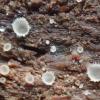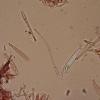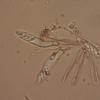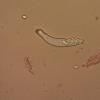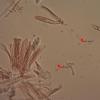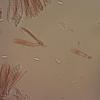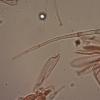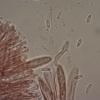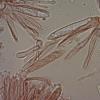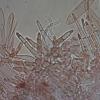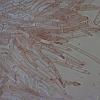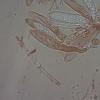
08-12-2025 17:37
 Lothar Krieglsteiner
Lothar Krieglsteiner
20.6.25, on branch of Abies infected and thickened

17-02-2026 17:26
 Nicolas Suberbielle
Nicolas Suberbielle
Bonjour à tous, Je recherche cette publication :

15-02-2026 04:32
One more specimen that is giving me some descent a

17-02-2026 13:41
Isabelle CharissouBonjour, est-ce que quelqu'un pourrait me fournir

16-02-2026 18:34
 Thierry Blondelle
Thierry Blondelle
Bonjour,La micro de cet anamorphe de Hercospora su

16-02-2026 21:25
 Andreas Millinger
Andreas Millinger
Good evening,failed to find an idea for this fungu

16-02-2026 17:14
Joanne TaylorLast week we published the following paper where w

16-02-2026 16:53
Isabelle CharissouBonjour, quelqu'un pourrait-il me transmettre un
Hyaloscypha leuconica?
Marc Detollenaere,
18-03-2023 08:31
 Good morning Forum,
Good morning Forum,Could anyone help me to identify this Hyaloscypha? It was growing on a fallen trunk of Quercus robur .Hairs were tapering, not bearing resine in water mounts, 70-80µ long.Asci were MLZ+ and measured 44x7µ.No croziers were found. The spores measured 6.6-7.5x2.4-2.6µ and contained a few small drops. H leuconica could match.
Kosonen Timo,
18-03-2023 09:00

Re : Hyaloscypha leuconica?
Hi Marc,
I think you have the good ol' Olla transiens here: spores <10 um, with two small +- polar (near each end) guttulae, multiseptate (or more than one anyway) hairs with dextrinoid apex (it's very modest -small in the long hairs, but observe the small hairs with huge glassy parts.
The ascus base is a bit of a mystery to me. I think there are records of "Olla transiens" with both with and without crozier. The morphological interpretation (if a crozier exists) is sometimes difficult especially if the crozier is inconspicious, but. yeah. maybe someone else can shed some light here. I know Zotto has folders from both crozier+ and crozier- Olla millepunctata for example. I have some sequences of Olla transiens both with and without but there's no indication of, say, with-crozier samples grouping together.
The "wet - greasy" looks of the hairs in the macro is something I connect with Olla transiens also. Hyaloscyphas have often a slightly more elegant looks, if you may.
Timo
I think you have the good ol' Olla transiens here: spores <10 um, with two small +- polar (near each end) guttulae, multiseptate (or more than one anyway) hairs with dextrinoid apex (it's very modest -small in the long hairs, but observe the small hairs with huge glassy parts.
The ascus base is a bit of a mystery to me. I think there are records of "Olla transiens" with both with and without crozier. The morphological interpretation (if a crozier exists) is sometimes difficult especially if the crozier is inconspicious, but. yeah. maybe someone else can shed some light here. I know Zotto has folders from both crozier+ and crozier- Olla millepunctata for example. I have some sequences of Olla transiens both with and without but there's no indication of, say, with-crozier samples grouping together.
The "wet - greasy" looks of the hairs in the macro is something I connect with Olla transiens also. Hyaloscyphas have often a slightly more elegant looks, if you may.
Timo
Hans-Otto Baral,
18-03-2023 09:40

Re : Hyaloscypha leuconica?
Difficult to say with the ascus base. The photos are often unfortunate, maybe too small, but I tend to be sure that croziers are absent.
Another option would be Psilocistella quercina, but there the asci have clear croziers.
Did you test the ascus reaction also with IKI? O. transiens tends to be hemiamyloid, i.e. turning dirty reddish at higher iodine concentration.
Olla transiens had never true croziers in the many finds I saw but often a basal protuberance which can be mistaken for a crozier. Usually the hairs have glassy caps but these are sometimes partly and rarely completely missing. The easiest would be if you find some glassy caps.
Ingo Wagner,
18-03-2023 16:29

Re : Hyaloscypha leuconica?
Hello!
Micropicture 1 and 4 show the transiens-hairs and the last picture show "croziers = negative". In my opinion it is clear Olla transiens.
Greetings
Ingo
Micropicture 1 and 4 show the transiens-hairs and the last picture show "croziers = negative". In my opinion it is clear Olla transiens.
Greetings
Ingo
Hans-Otto Baral,
18-03-2023 17:02

Re : Hyaloscypha leuconica?
Indeed Ingo, I overlooked, perhaps because most of these glassy tips (I now count 5-6) are unfortunately unsharp on these pics.
Marc Detollenaere,
18-03-2023 17:04
Hans-Otto Baral,
18-03-2023 17:14

Re : Hyaloscypha leuconica?
yes, very clear and typical. So the reaction was blue? Is the iodine strong enough? But the reaction is only very indistictly red in this species as I remember.

